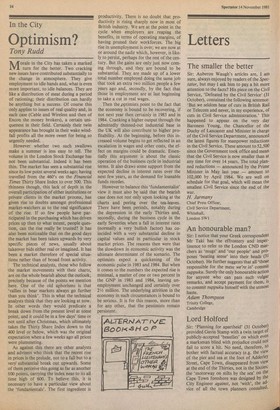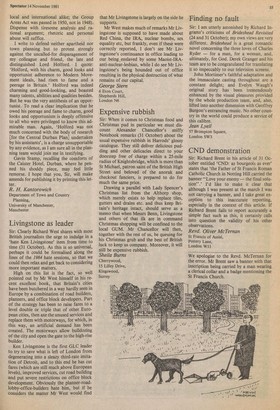Lord Holford
Sir: 'Planning for apartheid' (31 October) provided Gavin Stamp with a twin target of publicly-accepted `beastlies' on which even a marksman blind with prejudice could not fail to score a hit. No need, therefore, to bother with factual accuracy (e.g. the view of the pier and sea at the foot of Adderley Street, Cape Town, disappeared from view at the end of the Thirties, not in the Sixties; the 'motorway on stilts by the sea' on the Cape Town foreshore was designed by the City Engineer against, not 'with', the advice of all the town planners consulted, local and international alike; the Group Areas Act was passed in 1950, not in 1948). Dispense with tiresome analysis and rational argument; rhetoric and personal abuse will suffice.
I write to defend neither apartheid nor town planning but to protest strongly against the uncalled-for disparagement of my colleague and friend, the late and distinguished Lord Holford. I quote: 'Holford, with his charm, good looks and opportunist adherence to Modern Movement ideals, had risen to fame and a peerage in Britain.' Holford was indeed charming and good-looking, and boasted many talents, abilities and qualities besides. But he was the very antithesis of an opportunist. To read a clear implication that he owed his peerage and fame to charm, good looks and opportunism is deeply offensive to all who were privileged to know this admirable man. Again, 'Holford was not much concerned with the body of research [for the Central Durban Plan] undertaken by his assistants', is a charge unsupportable by any evidence, as I am sure all in the planning team would join me in testifying.
Gavin Stamp, recalling the comforts of the Caister Hotel, Durban, where he penned his shoddy piece, may feel little remorse. I hope that you, Sir, will make amends for publishing it by printing this letter.
R. H. Kantorowich
Department of Town and Country Planning, University of Manchester, Manchester



































 Previous page
Previous page